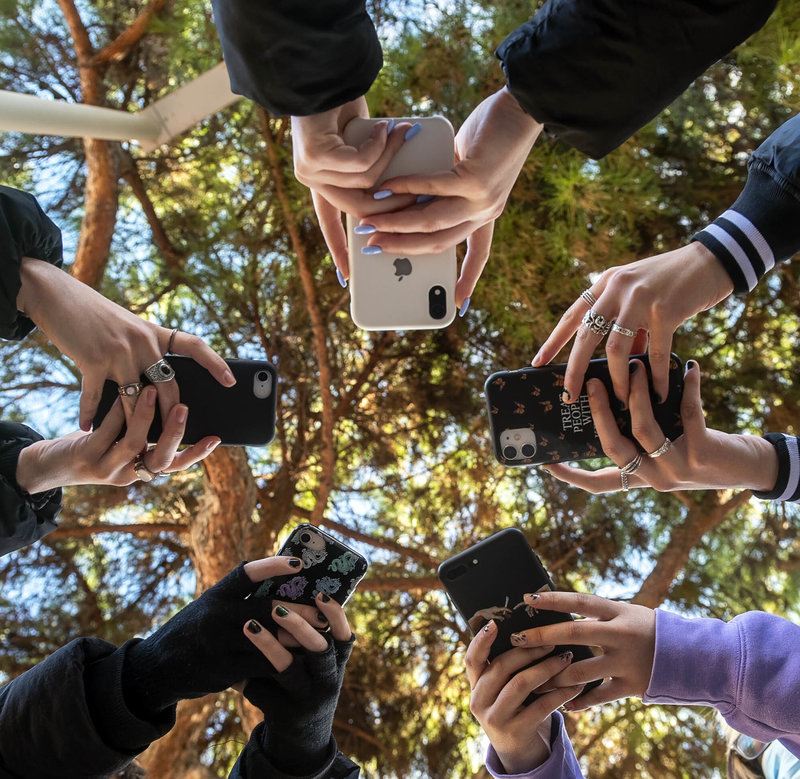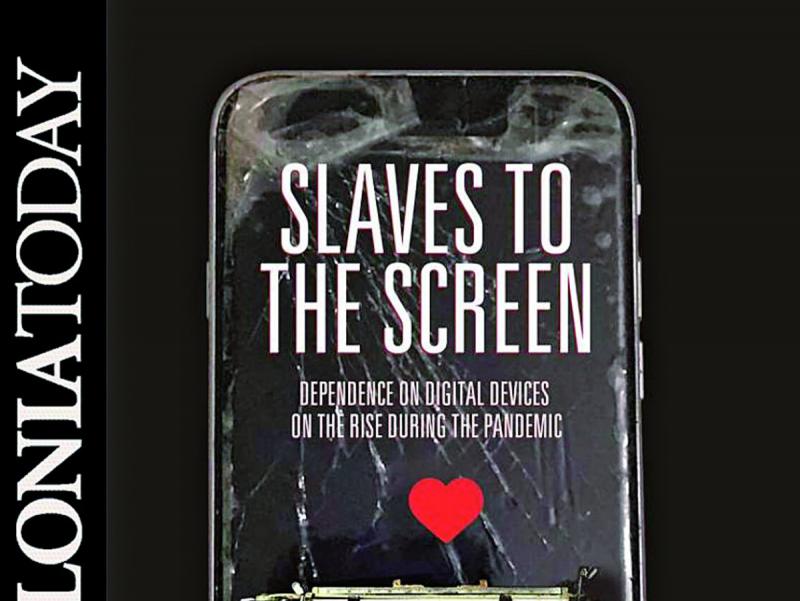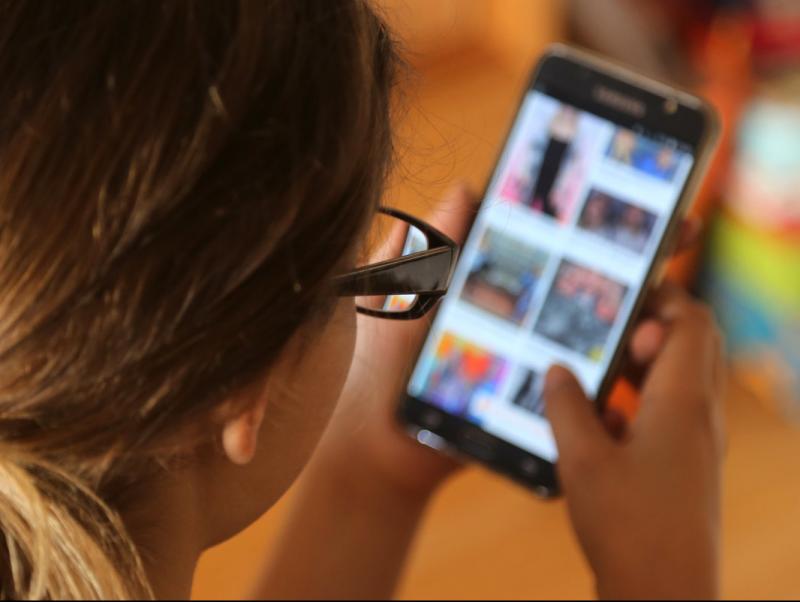T. Márquez / S. Muñoz. tmarquez@elpuntavui.cat
Hookedon phones
Teenagers today live on their phones and seem largely unaware of the need to set some limits
The data say it all: their lives revolve around a device. The dependency of teenagers on electronic devices, especially mobile phones, may have already passed the point of no return. The typical profile is well-defined. According to Unicef’s latest report on the impact of technology among young people, children on average get their first mobile phone at the age of 11, some 80% of young people are “hooked” to a minimum of three social networks, and most connect to the internet every day, and for a minimum of five hours a day. The head of the study, Antonio Rial, a professor of psychology at the University of Santiago de Compostela, speaks bluntly about a “public health problem” that is having a major impact on the daily lives of children.
The report, which assesses the responses of 50,000 secondary school pupils around Spain, states that the dependency on smartphones is so high that more than half of teenagers sleep with their device close to hand, with 20% saying they use it after midnight. One of the most common problems among young people is an addiction to online gambling.
However, clinical psychologist Elena Flores, from the addictive behaviour unit at Sant Joan de Déu Hospital, says that the problem goes further. “The mobile phone is used as a tool to access certain applications that can end up being addictive and that create in the person the same pattern as other substances,” she explains, adding: “We don’t find people addicted to Outlook, but we do see problematic use in the case of Instagram.” As a group, girls are more prone to become addicted to apps, while boys have more trouble with online gaming. “In the field of mental health we have a diagnosis for video game addiction but we don’t have one for excessive use of apps,” she says, calling it “a step backwards in terms of research and prevention in the public mental health network.”
More data about pathological gambling and other behavioural addictions come from the psychiatric service of Bellvitge University Hospital. As of September, 231 patients aged 16 to 21 had been treated: 63.6% for gambling; 26.4% for video game addiction; 8.2% for other problems related to new technologies; 0.4% for purchases; 0.4% for sex; and 0.9% for other reasons. “The mobile phone is the gateway, the instrument through which one falls into addiction,” say hospital sources.
Flores acknowledges that the lines between use, overuse and addiction are thin. “Rather han the number of hours, we talk about overuse of devices when there is an associated problem, such as impairment in academic performance, social isolation or behaviour problems, and we talk about addiction when this situation lasts over time and requires treatment.”
The Unicef study also found that 44% of young people connect so as not to feel alone and 58% do so to make friends. Families claim to have control over their children’s internet use, but the study insists that it is more of a feeling than a reality. Most young people have more than one online profile, allowing them to interact separately with family and friends.
Is there such a thing as normal mobile phone use? The answer from Sant Joan de Déu Hospital is clear: “We don’t talk about normal use because normalcy today is overuse. It’s better to talk about responsible use,” says Flores.
In particular, the experts warn about the role of electronic devices as the gateway to the internet: 22.5% of teens have been bullied online or involved in harassing another person. Consumption of pornography also claims a place in the ranking, with 35% of teenagers admitting to using it, while 4.7% say they have been on the dark web, which has paedophile content.
In 2022, it will be 10 years since the Desconect@ programme began, which was designed to deal with addictions to new technology. The programme’s director, Marc Masip, believes that society “is becoming more aware of the problems from overuse of mobile phones,” and he adds that technology companies “see in children a good opportunity to do business.”
Masip compares mobile phone addiction to drug addiction and calls for “more training for parents or changes in the law to allow more control over the access of minors to online games or pornography, for example. “Mobile phones could be banned at school,” he says, admitting “we are late”, and pointing out that “adults are not always a good example, as the main cause of traffic accidents is the use of mobiles while driving.” Masip admits that the pandemic has seen a rise in the number of teenagers hooked on mobile phones, but adds that it is also because “the detection of existing cases has increased, as parents have now had more of a chance to see how their children behave.”
feature living online
Seeing the positive side
Mobile phones and new technology in general also open up to us a vast world of opportunity. Ferran Lalueza, Professor of Information and Communication Sciences at the UOC, says “this is a breakthrough that, with a dose of rational use, is positive overall.” He is a good example, because he teaches online. Yet Lalueza admits that the abuse of devices, with smartphones the most common among young people, “limits us when interacting with others and undermines our communication skills. “Live communication is key to human relationships and communicating with a device implies a loss of authenticity,” he adds. He recommends above all maintaining close direct contact in situations that demand warmth, such as a funeral or a birthday.
Computer engineer Josep Maria Ganyet, professor of new media in audiovisual communication studies at UPF, also points out the positive side of the mobile: “It’s for fun, to experience other realities.” Yet he warns that the universalisation of this device “should not prevent us from devoting time to other activities.” “If the phone is the centre of our lives, or that of our children, then we have a problem,” he adds. As a parent, he says: “We need to intervene when you find that it’s taking away more than it’s giving, when you find that it’s your child’s only activity.” Ganyet thinks the industry traps everyone “with small rewards, hacking into our weaknesses through the ’like’ culture,” and he recommends parents try to set an example. “You can’t tell them not to smoke with a cigarette in your hand. Well, it’s the same with the mobile phone.”







